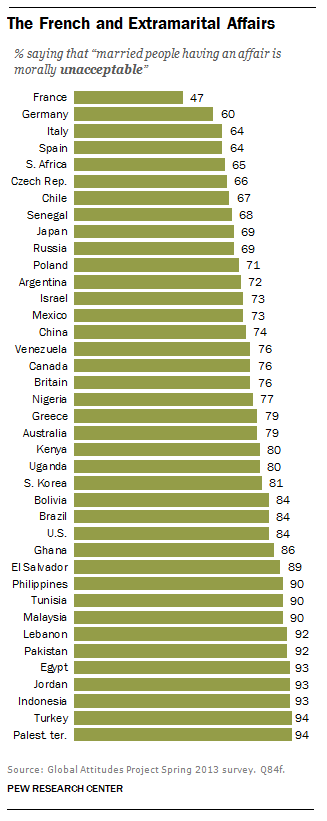The French celebrity rag Closer recently reported that, at some point, President Francois Hollande scootered over to a stylish corner of Paris, entered a (possibly mob-linked?) apartment, and allegedly spent what we can only assume was an awesome night with actress Julie Gayet. On his way out, he dined on some bodyguard-delivered fresh croissants, and then probably crept back into Élysée Palace.

When his real girlfriend, and the “First Lady” of France, journalist Valerie Trierweiler got wind of these details, she “was taken to a hospital, suffering what friends told journalists was a ‘severe bout of the blues,'” the Los Angeles Times reported.
The dalliance of a U.S. president would surely have prompted an all-out Puritanical firestorm from the American press. But Kim Willsher of the Guardiannotes that the mainstream French media haven’t really taken much interest in the scandal, preferring to focus on more substantive matters. “In short, it mattered less that he was cheating on his partner than that he had become a social democrat,” she wrote. “In any case, only the perfidious and prurient ‘Anglo-Saxonne’ press was interested in the former.”
Indeed. The trashy British tabloid Daily Mailwas affronted by the fact that French reporters didn’t manhandle the president at a Tuesday press conference. It denigrated them as sycophants: “Before him sat a salon of oyster munchers, the powdered, poodling, truth-smothering trusties of polite Parisian opinion,” it opined. “They are aghast that the peasants should be told about presidential legeauver. No wonder they never tell their people the truth about the European Commission.” The Daily Telegraph had similar complaints. “Well, we British were being taught an important lesson,” it wrote. “For centuries we had mockingly stereotyped the French as sex-mad. When, in reality, these spotlessly abstemious souls have so little interest in sex that when their own head of state is caught up in the juiciest scandal to hit politics since Clinton-Lewinsky, they only want to ask about social security.”
France24.com’s editor-in-chief, Sylvain Attal, responded logically to the criticism, lamenting that, actually, the story in France had received far more coverage than the dictates of “French journalistic custom” require.
[T]he English are taking us to task for not sticking our noses in the president’s bedroom – for not asking him how long his affair has been going on, how often he and his mistress see each other, whether or not Valerie knew, and how he can be trusted to keep his promises to the electorate if he can’t even keep his promises to a woman.
Pardon my French, but who cares? As long as our president doesn’t start awarding perks and privileges to those he chooses to socialise with, I don’t see why this is our business.
Attal is right. Who cares? Certainly not the French. According to a Pew Research Center survey of 39 countries conducted in 2013, roughly 53 percent of French people don’t find it “morally unacceptable for married people to have an affair.” As the graph above shows, France has the lowest percentage of moral concern among all the countries surveyed. Around 40 percent of the respondents believe it’s simply “not a moral issue” and another 12 percent believe it’s the moral thing to do. In the U.S., which is tied with Bolivia and Brazil, 84 percent believe it’s wrong.
As Pew notes, the results are consistent with another poll, which was conducted shortly after the Hollande story broke: “77% of the French considered it a private affair that concerned only the president, while 23% said it was a matter of public concern.”
And for French leaders, this type of misbehavior dates back centuries. As Pew notes: “In 1899, President Felix Faure died in the Elysee Palace in the arms of his mistress. Napoleon, an emperor not a president, was unfaithful to his wife Josephine, engaging in a long line of mistresses.” The trend has not halted in recent times. “[E]very president to have held power in France since 1974 has been rumoured to have cheated on their wives,” according to TheGuardian‘s data blog.
The Guardian points toinfidelityresearch that indicates that “greater marital happiness and religiosity” and higher “sexual satisfaction in [a] relationship” make it less likely that people will cheat on their partners. What The Guardian fails to point out is that the more recent study by researchers at the University of Indiana actually reveals that the strongest predictors of infidelity are what the paper terms “sexual personality traits.” People who are generally more sexually excited, have anxiety about sexual performance (suggesting that people seek out someone other than their partner to have bad sex with), and who are not worried about sexual consequences such as STDs and unwanted pregnancies are statistically more likely to be cheaters.
The study also concluded that there could be personality factors outside its analysis that predict infidelity. One 2004 study in the European Journal of Personality, which examined survey results from 16,362 participants in 52 countries, suggested that “low levels of agreeableness and conscientiousness” are correlated with sleeping around.
So, with all this, can we draw any real connections to why the French, in particular, have flexible attitudes about infidelity? According to Gallup data, France ranks as the world’s fourth most atheist, a clear predictor. Secondly, judging from the fact that the country has rated as the rudest destination for the world’s travelers, France also may not be the most “agreeable,” a second precursor. Combine those factors with a history of sexual adventurism, and you can sort of start to see how the laissez-faire attitude emerged.
But, most importantly, that’s all it is. An attitude, a philosophy that hasn’t necessarily translated into practice. Americans may be less tolerant of infidelity, but they actually cheat as much, or even more, than their French counterparts. The French just happen to be less inclined to get in-your-face about guilt and morality, especially when the issue is, as Attal argued, not their business.





